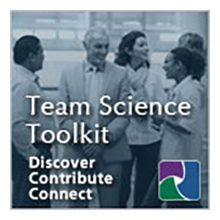|
Stephen M. Fiore
Abstract: This panel centers on understanding interdisciplinary team science training and professional development. As team science becomes more prevalent, interdisciplinary teams of researchers are, themselves, studying the competencies leading to success in scientific teams. This panel brings together a set of three researchers who are involved in NSF funded research to improve our understanding of scientific collaboration. Dr. Troy Hartley will represent the project "Team Science Training for Coastal Ocean & Estuarine STEM Graduate Students". This project addresses how team science workshop interventions can be used in combination with problem-based learning to improve interdisciplinary graduate education on complex collaborative problem solving. Dr. Stephen M. Fiore, will represent his project on "Exploring the Knowledge, Skill, and Attitude Competencies Associated with Interdisciplinary Team Effectiveness". This research aims to develop a better understanding of team science competencies contributing to effective convergence science. Dr. Debbie Diaz Granados will provide insights from organizational psychology and how training theory can inform this area of research. Margaret Webb is a New Orleans native, a mechanical engineering graduate of Rice University, and a current Ph.D. student in engineering education at Virginia Tech. She will describe the work she is doing to understand and improve organizational structures and academic culture that thwart interdisciplinary collaboration and graduate interdisciplinary development. Panelists will respond to a set of question, including, but not limited to:
(1) What has your project told you about key deficiencies in team science education and professional development?
(2) Are you developing different approaches for improving cognitive, attitudinal, or behavioral competencies in team science?
(3) Are you developing techniques to address group dynamics that may arise because of demographic differences in teams?
(4) What can universities do to improve team science training and professional development for students and faculty?
(5) Based upon your projects, what recommendations would you make to those working to improve team science competencies in their own research teams?
Questions from attendees will also be brought into the discussion. The overarching goal of this panel is to help develop a more thorough understanding of the knowledge, skill, and attitude competencies associated with scientific teamwork. In this way, we help improve study of the relationship between team science competencies and team effectiveness.
|

